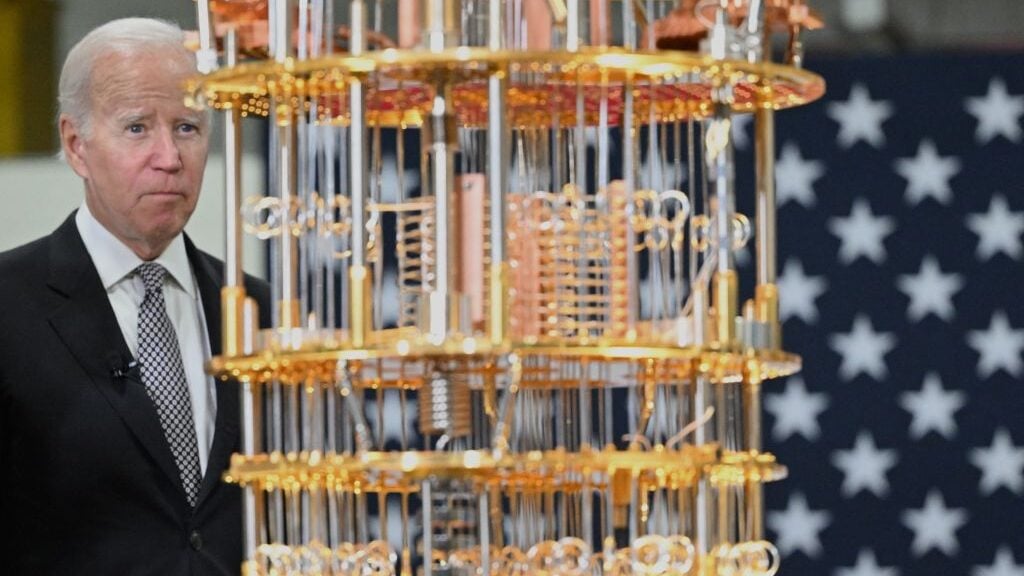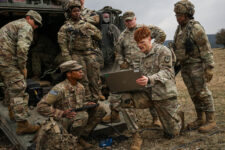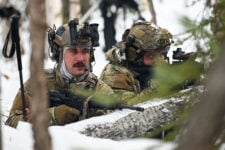
US President Joe Biden looks at a quantum computer as he tours the IBM facility in Poughkeepsie, New York on October 6, 2022. (MANDEL NGAN/AFP via Getty Images)
Quantum computing, at least on paper, is a game changer for national security, and the US government has been pursuing it accordingly. But those efforts are scattershot, and often include overlapping areas of focus. In this new op-ed, Rebecca Grant of IRIS Research calls for Congress to appoint a lead DoD official to wrangle the various quantum lines of research.
Just when you thought drones, artificial intelligence and hypersonic missiles were the must-haves for future warfare, here comes yet another priority: quantum computing.
Quantum computing literally changes the basis of information sciences. The Pentagon knows that, and has been fueling quantum information science research for years. In fact, across the government, there are no less than 14 quantum-focused centers at work on problems ranging from communications to extreme computing and entanglement distribution for secure encryption.
And that’s the problem: there are simply too many cooks and no head chef in this kitchen.
That’s why Rep. Elise Stefanik (R-New York) is considering legislation to create a Principal Quantum Adviser for the Defense Department: one individual empowered to wrangle the portfolio of current quantum programs across the services, combatant commanders and major industry partnerships. It’s a great idea, as long as the new Quantum Czar is not stranded in a D-ring office isolated from major policy and budget discussions.
There’s no shortage of talent in the services, and they’ve been proactive on this technology. For example, the Air Force is already using quantum-enabled technologies for secure encryption, low probability of intercept communications, and inertial navigation for long-duration flight, according to Dr. Michael Hayduk, deputy director of the Air Force Research Laboratory’s Information Directorate. The Army expects near-term advances in sensing and timekeeping, followed by longer term “disruptive technological surprise,” according to Dr. Frederik Fatemi, the Army’s lead quantum scientist.
Last summer, Army Secretary Christine Wormuth designated the Army Research Office as an official Department of Defense Quantum Information Science Research Centers. The Army center joins the partnership between the Naval and Air Force Research Laboratories, plus the Laboratory for Physical Sciences (LPS) Qubit Collaboratory (LQC). There are another five centers in the National Science Foundation, and five more at the Department of Energy.
The private sector is of course forging ahead. The Air Force and IBM have been working together for years on quantum capabilities. Amazon’s Braket runs quantum jobs for customers as a service. Boulder, Colorado-based Infleqtion just unveiled a five-year plan to deliver fault-tolerant quantum computers. It’s clear the private sector believes quantum technologies have advanced to the point where diversified, long-range planning is essential.
RELATED: ‘Off to the races’: DARPA, Harvard breakthrough brings quantum computing years closer
All that investment is undoubtedly good, but it’s time for the Pentagon to get its line-up in order. Quantum may end up as revolutionary as the airplane, but we don’t have the grace period of the interwar years to figure it out. Think about it this way: During the space race, the US pulled ahead, and enjoyed the growth of miliary space capabilities in the 1980s and 1990s with little opposition and an uncrowded, uncontested environment on orbit. With quantum, China is already much closer than we’d like them to be.
Fortunately, there’s bipartisan support for making sure that China does not pull ahead. National security quantum research is also taking place in several states and with allies such as Great Britain, Japan and Australia. NATO released its first-ever quantum strategy on January 17, 2024. The 32-member alliance set a “strategic ambition to be a quantum-ready alliance” with a secure, resilient quantum ecosystem to ensure NATO reaps the strategic advantages.
The Quantum Czar needs to be that informed leader who can grasp the early connections between quantum capabilities and practical, battlespace needs. The best thing a DoD Quantum Czar can do is help choose and clarify military requirements so that industry partners can plan out investments. A DoD Quantum Czar also must have standing to work across the whole of government, and so Congress should empower the Principal Quantum Adviser to work with the Department of Energy and with allies.
Breakthroughs for national security will take a lot of sustained investment. For example, the Air Force recently opened a new Extreme Computing Facility in Rome, New York. The facility included three new labs, all needing special air conditioning, vibration controls, etc. to carry out the sophisticated research tasks. Quantum computing advances aren’t like writing software in a California garage; scaling and speeding up quantum research will take careful planning.
Whoever gets the job as the Pentagon’s quantum Czar will have their hands full. But there are some early moves they should make.
RELATED: Saving Schrödinger’s Cat: Getting serious about post-quantum encryption in 2024
First, find the overlap. All the services are interested in common areas like advanced detection of bunkers and underground targets. Another challenge for all the services is moving innovative products from laboratory applications to less expensive, deployable systems. See where focus areas overlap and consolidate the research.
Second, make logistics a key area of focus. A lot of the early money and business case behind quantum has centered on securing and optimizing supply chains — and logistics are a huge vulnerability for the Department of Defense. (Imagine Navy destroyers that can’t reload missiles or helicopters and drones running low on parts and fuel. Or don’t imagine, and just look at what is happening to Ukraine right now.) Corruption of the data systems that propel modern combat has been a worry for years; the supply chain should be one of the early adopters of quantum solutions.
Finally, the national security focus on quantum should flow naturally into proactive export controls. The Commerce Department needs to define chokepoints — chips or tooling, for example — that lead to meaningful restrictions which protect national security interests but don’t stifle market development.
Quantum information science comes with own quirky vocabulary and revolutionary concepts. However, having a post-graduate understanding of quantum information science isn’t necessary in order to grasp its importance to national security. Finding someone to fill this role who understands how to operate within the Pentagon will be important — but the biggest priority is that this quantum leader be empowered by the highest levels of the department to get things done.
That’s where the energy belongs, and it’s high time to find a leader in the Pentagon to help sharpen America’s edge.
Dr. Rebecca Grant is a national security analyst based in Washington, DC, where she is President of IRIS Independent Research and a Visiting Fellow of the Lexington Institute.
Air Force awards SNC $13B contract for new ‘Doomsday’ plane
The win is a major victory for the firm in a competition that saw the surprise elimination of aerospace giant Boeing.


























